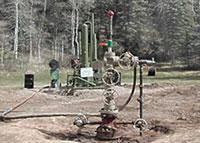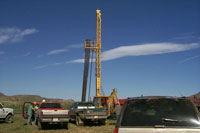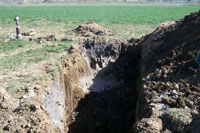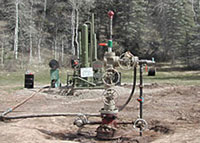It started out as a simple item on a regional planning commission agenda in remote Delta County, Colo.

A recently reworked natural gas well in Delta County.
Photo: Jeremy Puckett, WSERC.
But since that meeting on April 9, the possibility that up to 600 coal bed methane wells could be drilled here has whipped up a firestorm of dissent in this quiet western Colorado valley. It has flushed hundreds of ranchers, fruit farmers, housewives, realtors, and environmentalists to public hearings, where they speak out against an economic, social, and environmental threat they fear could ruin their community and livelihoods.
Why? Because coal bed methane (CBM) mining is far more intensive than traditional natural gas extraction. CBM is a form of natural gas, but accessing it means drilling multiple wells close together, then connecting them with a network of power lines, roads, pipelines, and compressor stations.
“Of the close to 1,000 people I’ve talked to, I’ve only heard two people in favor of [coal bed methane exploration],” said Larry Jensen, who ranches near the town of Crawford (pop. 366).
Local environmentalist Tara Thomas traces the strong outcry to the community’s unique character: “This valley is beautiful, but it’s not a ski resort,” she said. “And it’s blue collar, but it’s not a rural sacrifice zone with an interstate entrance and a Wal-Mart. People here are very connected to the land, whether they’re ranching it, farming it, hunting in it, or hiking it.”
Thomas is the executive director of the Western Slope Environmental Resource Council, the watchdog group that first brought the coal bed methane issue to the public eye. In late May, WSERC convened an all-volunteer group called the Grand Mesa Citizens Alliance, which has sworn to research every possible legal, regulatory, and constitutional avenue to safeguard its valley from coal bed methane development.
“We want to provide the county commissioners with the tools to defeat this thing,” said environmental activist John Moore, a resident of Crawford and a member of the alliance.

Not very well. A coal bed methane well in Montana.
Photo: Montana State DEQ.
The anti-coal bed methane sentiment in Delta County is heightened by stories coming from communities already affected by such development, like the Powder River Basin in Wyoming and Montana, and nearby Garfield and La Plata counties in Colorado. Coal bed methane drilling can contaminate water supplies with salt, benzene, and other toxic byproducts. No one knows what the full extent of the hazards might be, and reclamation standards are lax. Much of the drilling process is regulated by the Colorado Oil and Gas Conservation Commission, whose membership is almost entirely drawn from the industry itself.
The commission has never denied a gas company’s request to increase the density of wells in a given area, according to Carl Roberts, who raises fruit and vegetables outside of Hotchkiss (pop. 968) and whose greatest concern is contaminated irrigation water.
“This is not a ‘Not in My Backyard’ kind of thing,” said Roberts. “We don’t wish this for anyone.”
Roberts should know. He grew up in Jal, N.M., the former “Natural Gas Capital of the World.”
“But it went bust, and now it’s a ghost town,” said Roberts. In 1997, he bought land in Garfield County, Colo., and was driven out by the “nonstop industrial-strength traffic” that developed after gas extraction took hold there.
“As a kid, I was told that oil and gas would be around forever,” he said. “But they were wrong, and when the end came our town was just a shell of its former self. The industry builds up communities and then lets them down. It ruins them.”
Bill Tennison, who works as a financial planner in Paonia, noted that Delta County is located between the hot real estate markets of Aspen and Telluride and said that the county’s economic growth hinges on its appeal to retiring baby boomers and others attracted to its clean air, clean water, and physical beauty.
“All we have to do is not screw it up,” he said. “And we can screw it up really fast by making Delta County the coal bed methane capital of Colorado. No one will want to live here.”
Three coal mines have been a feature of the local landscape for decades, and many local residents say that’s enough.
“We are astounded at those who tell us that as Americans we have an obligation to produce energy — we who are already producing 15 million tons of coal per year,” said Ed Marston, who has spent the last 20 years publishing High Country News, a newspaper covering natural resources in the West from its offices in Paonia, Colo.

It’s the pits: digging a coal bed methane well.
Photo: Montana State DEQ.
The alliance is moving fast, because time is short. The Delta County Commissioners may vote as early as this coming Monday (June 17) on whether to allow Gunnison Energy to take its first step — drilling five preliminary test wells.
“Five wells may not seem like much, but we’ve been told by other counties we need to stop [them] before they get their foot in the door,” said Crawford rancher Jensen. “Once they start, it’s hard to stop them.”
“The people don’t want it,” he added. “Just like in Florida. If the president wants to pull the plug on oil and gas drilling in the Everglades because it’s the will of the people down there, he should pull the plug here, too.”
Environmental activist Moore said the whole national energy policy is flawed.
“If just half the federal subsidies that go to the fossil fuel industries went to renewable energy research and development, we wouldn’t need this crazed assault on our western landscapes.”
The efforts of the group — and the community ferment from which it emerged — have won kudos from outside the area.
Actor and renewable energy advocate Dennis Weaver, who lives two hours away in Ridgeway, Colo., applauded Delta County’s “broad-based opposition to this social and environmental threat.”
Natural Resources Defense Council Senior Attorney Johanna Wald agreed: “What’s really impressive is how quickly the community came together and how well organized they are,” she said from her office in San Francisco. “In too many cases, people don’t even start organizing until they actually see coal bed methane development happen on the ground. And what they see isn’t pretty.”


